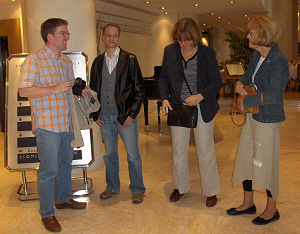 |
Issue 21 (1/2007)
|
|||
|
FSD Bulletin is the electronic newsletter of the Finnish Social Science Data Archive. The Bulletin provides information and news related to the data archive and social science research.
|
European Data Protection Practices under SpotlightHannele Keckman-Koivuniemi & Arja Kuula European data archivists travelled to Athens in October 2006 to attend the annual CESSDA Expert Seminar. The seminar, titled Open Access to Data, focused on data protection and anonymisation. FSD staff members Hannele Keckman-Koivuniemi and Arja Kuula attended. Varying practicesPresentations and discussions brought into highlight a well-known fact: EU countries have applied the Data Protection Directive differently, each in their own way. For example, national statistics agencies disseminate micro data for research purposes on different grounds. There was consensus among the participants that anonymisation and data protection should not be considered values in themselves. Researchers should be able to use research data in a variety of ways. Access to data should be improved. Arja Kuula's presentation focused on the anonymisation of data and how research subjects had reacted when asked permission to allow reuse of the data. The presentation generated a lively discussion.
Explicit consent usefulThe participants also agreed that the task of data archives would be easier if researchers were familiar with the basic principles of confidentiality and data protection. Rather than discuss different anonymisation methods, the participants focused on the nature of informed consent, and what kind of consent should be asked. If research subjects were informed of the possibility that the data may be shared, and appropriate consent forms were used, there would less need for processing and anonymisation of data at the data archive. This would greatly reduce the workload. Explicit consent given by research subjects would also allow easier access to non-anonymised data. This is particularly relevant if the data are of scientific importance. Informing researchersData archivists thought that, rather than anonymise data extensively, it would be better if the scientific community adopted good practices in confidentiality and research ethics. Therefore, researchers and students should be given information on these issues. Data archives could play an important role in this work. More information
» CESSDA Expert Seminar program and presentations
|
